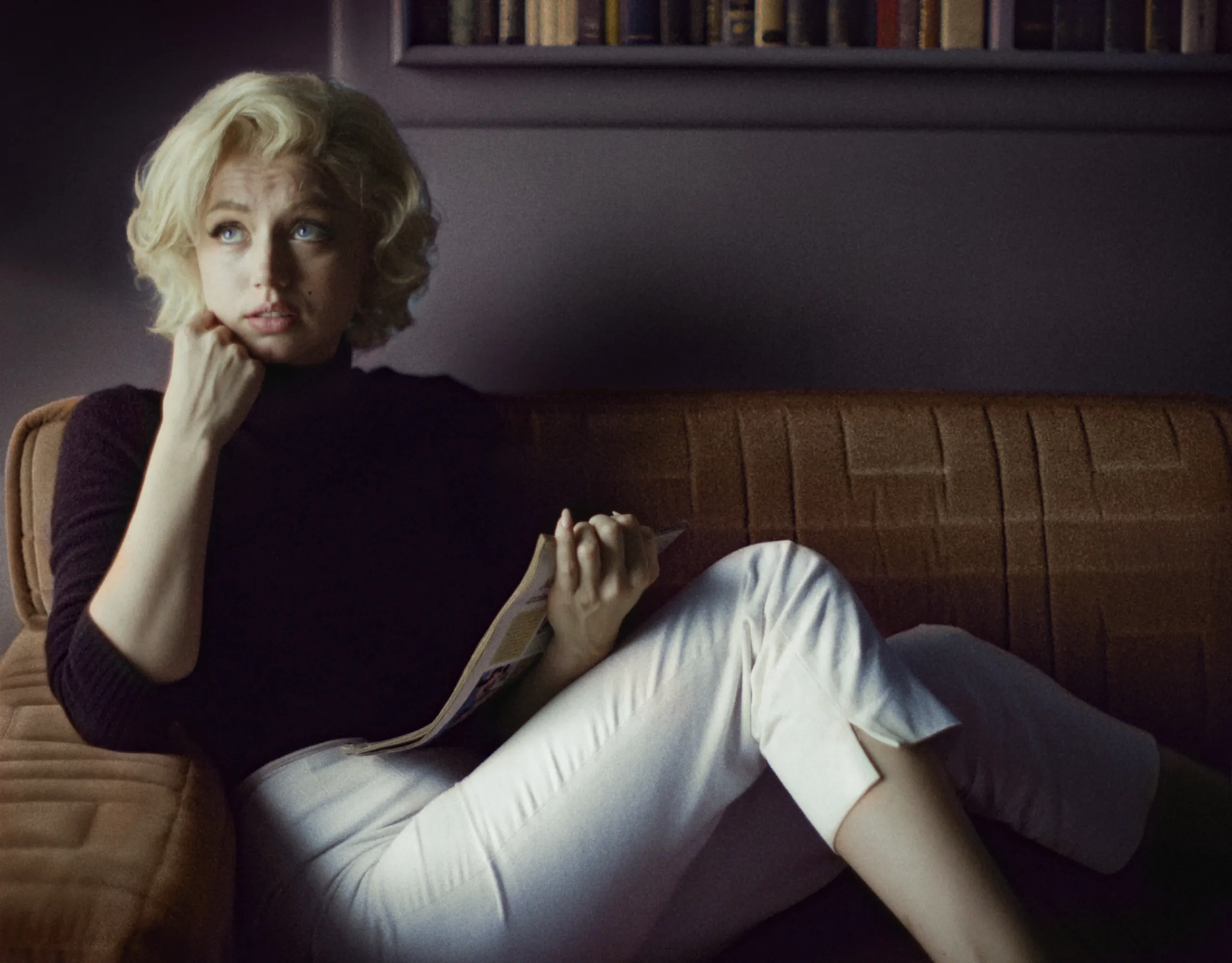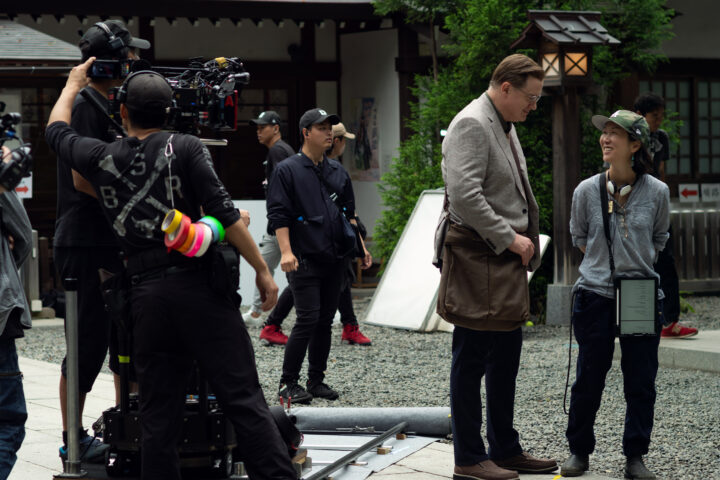Assertions that writer-director Andrew Dominik’s new Marilyn Monroe saga Blonde (Netflix, September 28), based on Joyce Carol Oates’ behemoth 2000 novel, is too dark, painful or even “exploitative” are missing the point. It’s almost as if the events of Monroe’s life, or at least the version told here—abandoned, scooped up, packaged for consumption and cruelly objectified and abused—are too much for some to bear.
Duly noted if you think that what Blonde is after—telling the story of a little girl lost and then used up in Hollywood—wasn’t worth doing. But one cannot objectively dismiss Dominik’s frequently stunning evocation of an era, industry and damaged psyche made with an auteur’s technique, skillfully blending fact and conjecture to construct an emotionally intimate epic delivered by a risk-reward, high-wire routine of investment and immersion by Ana de Armas, reincarnating a legend in a radical act of acting empathy.
The notion of the false self, and the misery derived from such a ruse, informs much of Blonde, and if we can take some of Oates’ partial fiction as fact—and we can—it cost Marilyn Monroe her relationships and happiness but also her sanity and probably her life. As the picture tells it, Monroe’s life in Hollywood was anything but a glamorous skyrocket.
Over the course of her years in the industry, she was so tortured by delivering a persona the industry and public craved that she never found a moment to be herself. “That thing up there isn’t me,” she whispers during the famed subway dress moment during the premiere of The Seven Year Itch. According to Oates and Dominik, it never was. Yet as she’s told by her inner circle, “Everyone would give their right arm to be you.” But who exactly was she?
In a canny amalgam of fact and invention, Blonde shifts and alters real and the suggested events in an attempt to get beneath the skin of a legend and to the heart of her damaged spirit. While the fact police may come out in full force, the rest of us will spend nearly three engrossing hours assembling the events and emotions that led to Monroe’s tragic 1962 death. Accidental overdose? Suicide? The picture makes a plausible case for either.
Dominik opens Blonde as a horror film, one of an emotionally unstable single mother (the excellent Julianne Nicholson) and adolescent daughter in tinseltown circle early 1930s, cooped up in a low-end hotel while pining for a long lost father (a picture of Clark Gable hangs on the wall as surrogate). While little Norma Jeane Baker yearns for the daddy she’s never met, mom goes off the deep end during a beautifully lensed, middle-of-the-night drive into the 1933 Griffith Park fire followed by an attempted bathtub drowning of her young daughter (“You’re the reason why he left!”), after which Norma Jeane is promptly shuttled off to an orphanage.
This is the first of many traumas and the thrust of Norma Jeane’s neurosis—the search for the love of an absent father. The second is her rape at the hands of a brutal studio exec. Across decades and relationships, including a scandalous, three-way affair with Charlie “Cass” Chaplin Jr. (Xavier Samuel) and Edward “Eddy” G. Robinson Jr. (Evan Williams) that produced an abortion and two failed marriages to a jealous, abusive Joe DiMaggio (Bobby Cannavale) and a supportive Arthur Miller (Adrien Brody) who saw her more as a muse, she refers to all men in her orbit as “daddy.”
About that abortion—Blonde isn’t for the squeamish, and Dominik pulls no punches in crafting a horror picture disguised as a biopic; scenes of scapulas invasively reaching inside Marilyn’s vagina (the camera is placed there at two junctures) and haunting moments where a talking fetus—her second pregnancy—begs not to be aborted carry, in 2022, unintended sociopolitical baggage.
No matter. This is sobering stuff, and right from her entre into the movie business, Blonde depicts doomed Norma Jeane as a classic example of fame exacerbating psychological frailty. Undoubtedly, it may be too much for some viewers, but rather than mere harrowing biopic there is a point, and a good one, about the mistreatment of a defenseless starlet by a cabal of exploitative industry men in a pre-#MeToo moment (even Billy Wilder doesn’t get out unscathed here) and the cost of celebrity, here a destructive yet inescapable martyrdom.
It’s fascinating to watch Blonde through a 2022 lens and consider the patriarchal cruelties endured in an era without protections. But such barbaric behavior wasn’t limited to Hollywood. Late in the picture, Marilyn is summoned to a Manhattan hotel room to perfunctorily perform oral sex on a crass John F. Kennedy (Caspar Phillipson), literally carried out immediately after by a pair of Secret Service agents.
While Blonde may sound like an endurance test, it is an undeniably moving one and contains its share of transcendent moments, including my favorite, which happens at the midpoint between Monroe and Miller. After arriving in New York for a read of Miller’s new play, the unlikely pair trade interpretations of Chekov and Miller’s in-the-works new drama. Brody’s reaction to the movie star’s smarts and insight is initially typical before giving way to something ultimately quite moving. The actor listens, leans in and offers a note-perfect moment of realization.
Dominik’s unwavering commitment to his vision is told in elliptical narrative style and with a mix of film stocks, aspect ratios, color and black-and-white. Whatever one thinks about the subject matter, the execution is the mark of a genuine artist and reminder that there are still (count them on one hand) a few left working in American film today (though technically Dominik is a New Zealander born Australian).
As for his star, de Armas creates a sort of alchemy with the viewer that strikes lightning and has the power to rouse you to genuine compassion. It’s the sort of acting rarity that only happens but once in a great while and across years of performances. It is a genuine tour de force of vulnerability that tears your heart out.
Cuban de Armas, who a decade ago barely spoke English and performed her first English-speaking role phonetically, is tremendous in channeling the Marilyn Monroe we know—the breathy cadence, sexuality both carnal and innocent, high voltage crowd-pleasing smile, all betraying a frightened, tense and often crumbling woman beneath bearing little resemblance to the persona.
It is a performance of cumulative power. In one bracing scene, she begs to “never play her again” before her longtime makeup artist lies her flat on a bed and paints Marilyn’s guise onto her tear-streaked face, assuring that “she’ll be here soon.” In another, she arrives at a premiere to a throng of male admirers, Dominik’s technique slightly elongating their jaws, hanging open in erotic deference to a bombshell cipher.
The picture’s costumes, hair and makeup are impeccable in conjuring Monroe—in fact, there’s a recreated Some Like it Hot singing scene where I swore I was seeing the real thing. Yet while there is considerable glamour in Blonde, particularly in the recreations of Gentlemen Prefer Blondes and The Seven Year Itch, darkness always just out of reach.
Blonde won’t be for everyone and many will see it as either mean-spirited or unnecessary. But in the final analysis of his closing moments, Dominik finds a way to finally give his Marilyn respite from torment, deploying an inspired double exposure to suggest that she could find peace only in death.
4 stars.




Whoa, Lee! Have to admit, I hadn’t paid much attention to the trailers for Blonde. After reading your review, I’m afraid I will miss out! I now look forward to seeing it and will let you know how it goes!
Julia, THANKS! Please report back here after you see it!